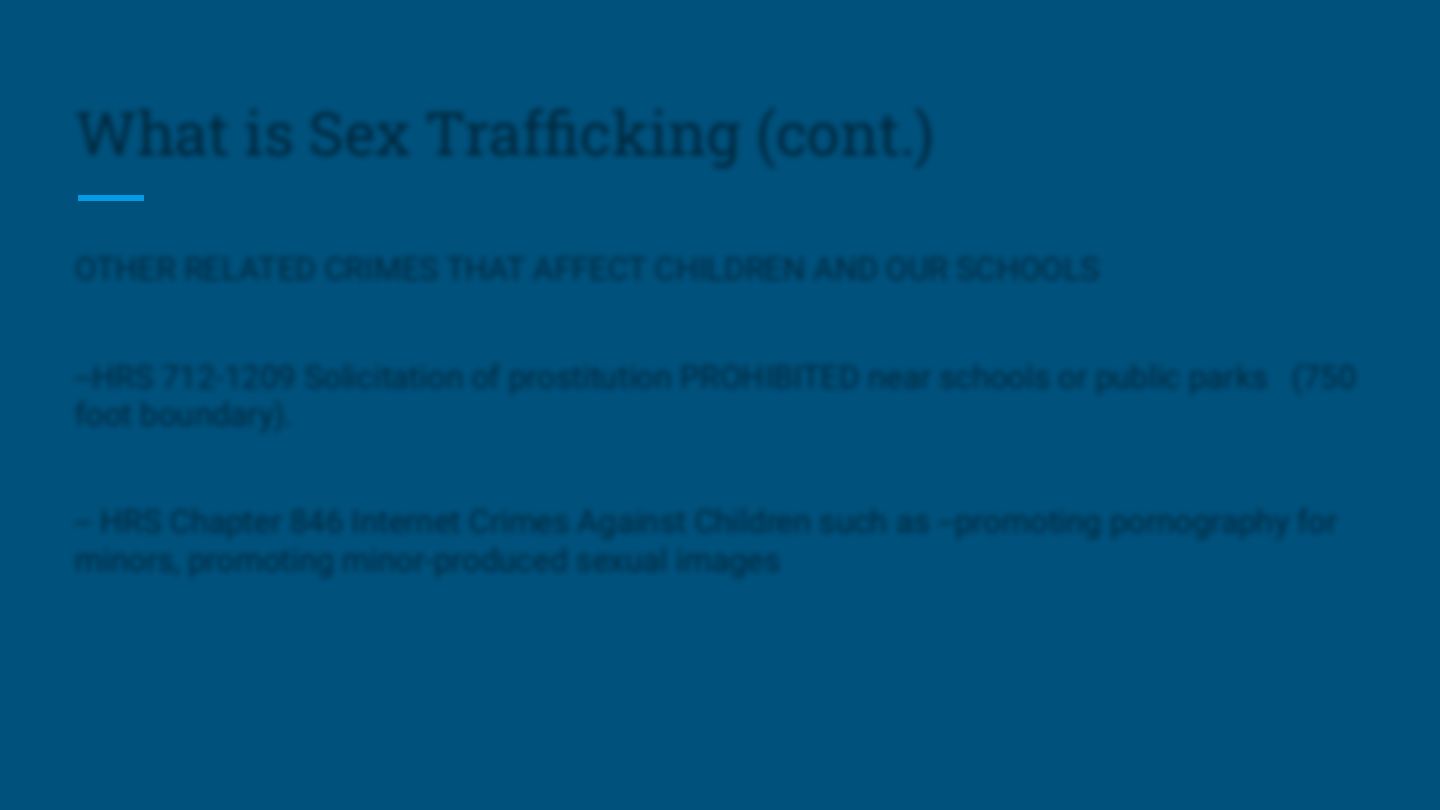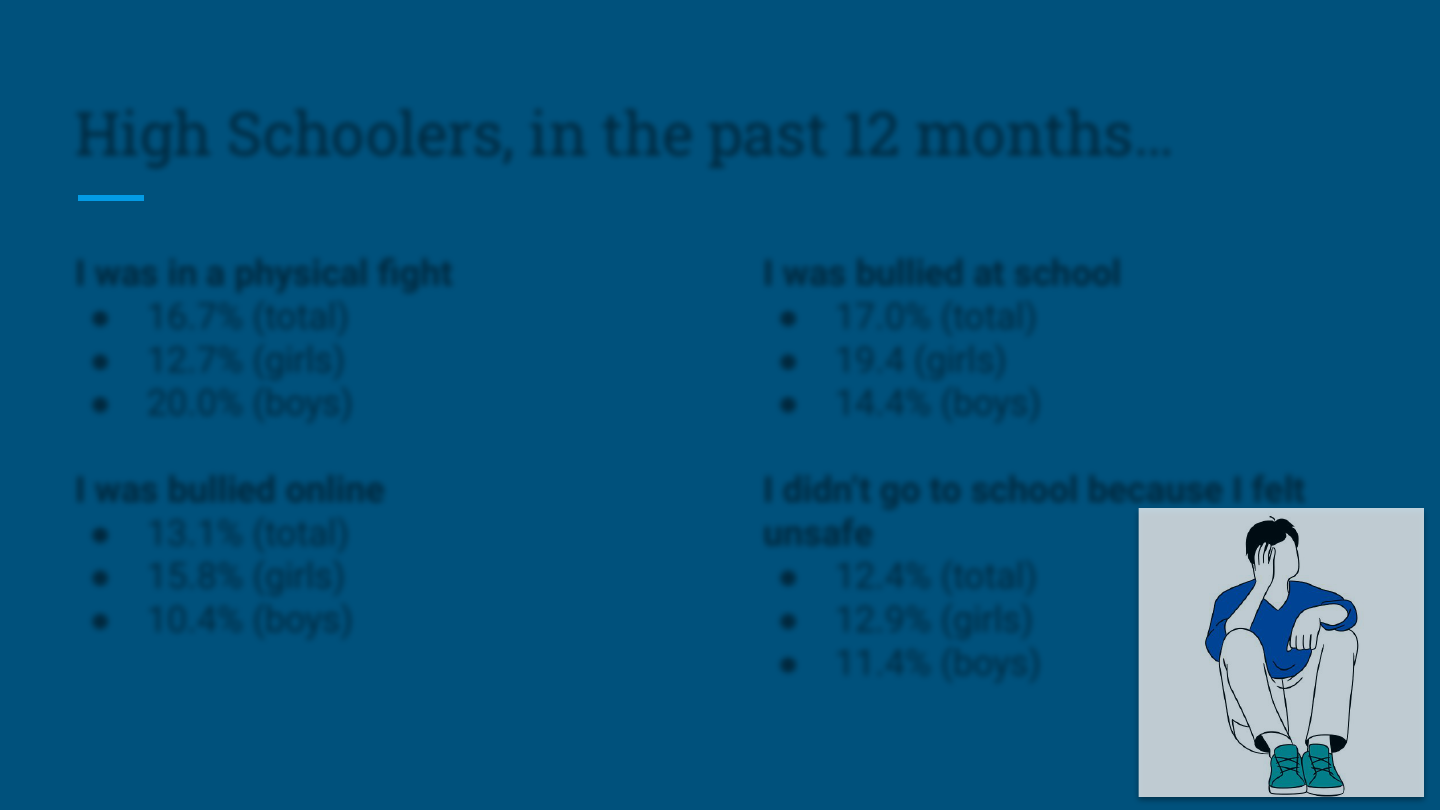
How Does Sex Trafficking
Impact Our Schools and
Students ?
Judge Karen Radius (Ret.)
Tim Hitchens, MSW
Maureen Ikeda Evans, Ed.D
May 1, 2021
Virtual Environment- Rooms With A View- Conversations
and Perspectives in Hawaii’s School Communities
Breakout Room #4

What is Sex Trafficking?
● In 2000 the U.S. Congress passed the Trafficking Victims Protection Act of 2000,
largely focusing on international and interstate trafficking and offenses that affect
interstate or foreign commerce and occur within maritime and/or federal lands
jurisdiction……such as military bases, federal properties.
● Severe form of trafficking in persons was defined as sex trafficking in which a
commercial sex act is induced by force, fraud or coercion or in which the person
induced to perform such act is under 18 years of age.
● For children under 18 there does not have to be a direct payment of money. The
federal definition of Sex trafficking for youth under 18 includes offering anything of
value in exchange for sexual acts., i.e. housing, food, clothing, cell phones, etc.

What is Sex Trafficking? (cont.)
● In 2016 the Hawaii State legislature passed amendments to our state criminal law to
establish a more victim and survivor-centered approach to comprehensive anti-sex
trafficking laws.
● HRS 710-1202 provides a person commits the offense of sex trafficking if the person
knowingly (a) advances prostitution by compelling or inducing a person by force,
threat, fraud or intimidation to engage in prostitution, or profits from such conduct by
another; or
(b) advances or profits from prostitution of a minor. (a person less than 18
years of age)
● There are several bills pending in the 2021 legislature which will amend Hawaii state
criminal law in this field if passed and signed by the Governor.

What is Sex Trafficking? (cont.)
Hawaii State Legislative Response
● In 2016--Amended the Hawaii Child Protective Act HRS 587A-4 definition of
harm/child abuse that brings a child within the purview of DHS/CWS to include sex
trafficking and labor trafficking.
And
● In 2017-- Amended HRS 350 -2 the mandated reporter law to require all mandated
reporters to report to DHS or the police ALL KNOWN OR SUSPECTED CHILD VICTIMS
OF SEX TRAFFICKING regardless of whether the parent, caretaker or family member
in the home is the trafficker or not.

What is Sex Trafficking (cont.)
OTHER RELATED CRIMES THAT AFFECT CHILDREN AND OUR SCHOOLS
--HRS 712-1209 Solicitation of prostitution PROHIBITED near schools or public parks (750
foot boundary).
-- HRS Chapter 846 Internet Crimes Against Children such as --promoting pornography for
minors, promoting minor-produced sexual images

Local Response to Sex Trafficking
● In May of 2017 THE CSEC STEERING COMMITTEE for Oahu was formed with
representatives of child serving state agencies , DOE, DHS, CAMHD, Family Court,
Children’s Justice Center, Office of Youth Services, MCCH, law enforcement (HPD),
Attorney General's Office, Honolulu Prosecutor’s Office and federal agencies such as
the US Attorney’s office, Homeland Security, FBI.
● FAMILY COURT GIRLS COURT has specialized program/court approach to girls and
youth who identify as female who are involved in CSEC.
● COMMUNITY AGENCIES/NON PROFITS have recognized the problem and are
providing some services such as school, community and agency-based professional
development, workshops and resources.

Are There Youth in Hawaii Involved in Sex Trafficking?
The short answer is YES
DOES IT AFFECT OUR SCHOOLS (Public/Private,Charter)? ABSOLUTELY
● Children who get caught up in the “life” are not in classes learning, taking advantage of the
opportunities education provides.
● When they do come on campus, they may be seen as misfits, disruptive, uncaring about
themselves or others, hard to deal with, mental health cases that drain resources from the
other children.
● Other students recognize that some of their schoolmates are in the life, and may feel like
they can’t tell anyone, that the adults should know this is happening if we opened our eyes
and hearts, that adults and the system as a whole just doesn’t care and law enforcement is
lame, not to be trusted.

Responding:
From Risk to Restoration
Empathy, not disclosure, is the key

All 22 participants were sex trafficked by
a sex trafficker in Hawaiʻi.
“They all attended school…. A number of
them were seen in emergency rooms as
minors for injuries from violence by their
sex trafficker. They were seen by hotel
staff, law enforcement, business owners,
sex buyers, and community members
during their sex trafficking experiences.
None of these bystanders offered support
to the victims in this study.”
What are we missing?

Risk & Response: Maslow’s Hierarchy of Needs
Connection and belonging with family,
friends, community, school, groups, a
significant other.
Safety from physical and emotional
harm and abuse; parents/ caregivers,
peers, strangers, chaos, the unknown.
Basic Needs: food, clothing, shelter,
protection from the elements,
transportation, solitude, drugs, access.

Risk & Response: Trauma
Trauma is the experience of severe psychological
distress following any terrible or life-threatening event.
(Psychology Today)
7 Types
● Acute
● Chronic
● Complex
● Developmental
● Historical
● Intergenerational
● Vicarious
BIG T
● Rape
● War
● Domestic Violence
● Child Abuse
● Slavery
● Immigration
● Happened to a
friend
little t
● Harassment
● Health Condition
● Family “Stuff”
● Inconsistent Caregiver
● Textbook Narratives
● Parenting Style
● Watching the news

Risk Factors & Vulnerabilities
Being a Teenager
● Puberty.
● Transition.
● Desire for love and acceptance.
● Desire for independence.
● Time alone in public places.
● Tests boundaries and take risks.
● Conflict or poor communication with
parents.
● Insecurities, low self esteem.
● Access to technology.
● Lack of support system.
Environment and Circumstances
● History of physical, sexual, emotional
abuse or neglect.
● Mental health or substance abuse issues.
● Involvement in the Juvenile Justice or
Child Welfare System.
● Family dysfunction, breakdown, poverty.
● Family, community, or societal
sexualization of girls.
● Family members or friends involved.
● Prostitution in the neighborhood.
● Runaway/throwaway/homeless.

High Schoolers, in the past 12 months…
I was in a physical fight
● 16.7% (total)
● 12.7% (girls)
● 20.0% (boys)
I was bullied online
● 13.1% (total)
● 15.8% (girls)
● 10.4% (boys)
I was bullied at school
● 17.0% (total)
● 19.4 (girls)
● 14.4% (boys)
I didn’t go to school because I felt
unsafe
● 12.4% (total)
● 12.9% (girls)
● 11.4% (boys)

High Schoolers, in the past 12 months…
I was physically forced to have
sexual intercourse
● 7.7% (total)
● 11.0% (girls)
● 4.6% (boys)
I have experienced sexual violence
by someone
● 10.8% (total)
● 14.1% (girls)
● 7.2% (boys)
I have experienced physical dating
violence
● 8.6% (total)
● 8.4% (girls)
● 8.4% (boys)
I had sexual intercourse before I
turned 13
● 2.9% (total)
● 2.5% (girls)
● 3.1% (boys)

High Schoolers, in the past 12 months…
I have felt sad or hopeless almost
every day for 2 or more weeks in a
row
● 34.7% (total)
● 44.1% (girls)
● 25.3% (boys)
I have seriously considered
attempting suicide
● 16.7% (total)
● 20.1% (girls)
● 13.3% (boys)
I made a plan about how I would
attempt suicide
● 14.6% (total)
● 17.8% (girls)
● 11.4% (boys)
I attempted suicide
● 10.5% (total)
● 11.2% (girls)
● 9.0% (boys)

Middle Schoolers, in the past 12 months…
I was bullied online
● 22.7% (total)
● 30.0% (girls)
● 16.0% (boys)
I was bullied at
school
● 37.8% (total)
● 42.1% (girls)
● 34.0% (boys)
I have seriously considered
attempting suicide
● 27.2% (total)
● 38.5% (girls)
● 16.7% (boys)
I made a plan about how I
would attempt suicide
● 18.7% (total)
● 25.0% (girls)
● 12.6% (boys)
I attempted suicide
● 13.0% (total)
● 17.8% (girls)
● 8.6% (boys)
I had sexual
intercourse before I
turned 11
● 2.4% (total)
● 1.8% (girls)
● 2.9% (boys)

Online Enticement During COVID-19

Difficulty Identifying
Young people who have been exploited often:
● Don’t perceive that they have been exploited or trafficked
● Don’t perceive trafficker as trafficker
● Have a distrust of law enforcement and service providers based on past
experiences or what they’ve been told
● Don’t perceive that they have better options
● Are psychologically controlled by or trauma bonded to trafficker
● Believe it is their fault and their responsibility
● Feel shame or blame
● Don’t think anyone will believe them

Consider Unidentified Survivors
● Be genuine. Use empathy, not sympathy or pity
● Be Clear and Consistent
● Be Trustworthy
● Pay Attention
● Promote positive self image, good friends, good adults
● Be intentional against shame, blame, fear, stigma, judgment
● Stand up for unidentified survivors
● Believe them

Continue this conversation with HNP
● Attend free, live webinars every Wednesday, 4-5:30pm.
● Ask about our 5th Grade SEL/ELA/Hā enrichment curriculum.
● Schedule a professional development training
○ Educators
○ Social Workers (for CEUs)
○ Law Enforcement
○ Healthcare Professionals
● Schedule a parent, caregiver, community presentation
Hoolanapua.org/education

What Can YOU Do About Sex Trafficking?
If you suspect trafficking, report it to DHS Child Welfare Services immediately,
1. Call the DHS hotline
2. Complete and fax the Mandatory Reporter Checklist form for Suspected Human Trafficking
(DHS-1685)
In June 2017 DHS established a hotline to report Child Sex and Labor Trafficking -Oahu (808) 832-1999
Toll Free from the Neighbor Islands or outside the state- (888) 398-1188
Mandated reporters are REQUIRED TO CALL. CONCERNED CITIZENS, FAMILY OR COMMUNITY MEMBERS
DHS Established a contract with Susannah Wesley Community Center Trafficking Victim Assistance Program (TVAP).. These folks will screen and
assess the youth, provide case management, therapy, and other services as well as work with law enforcement, DHS and the other team
members.
You may call other CSEC specialized agencies for a consultation but the actual report NEEDS TO be made to DHS child welfare services (as you
would report any other form of abuse)

What can YOU Do About Sex Trafficking
Build your knowledge and awareness and encourage others to do the same!
● Contact Tim at Hoʻōla Nā Pua for future training opportunities
● Check out the DOE Sexual Violence Prevention landing page for more
training opportunities
● Keep the conversations going with colleagues, friends, relatives, community

CSEC Resources
Department of Human Services trafficking hotline 808 832-1999. toll free neighbor islands 888-398-1188
http://humanservices.hawaii.gov/ssd/home/child-welfare-services
Department of Education Mandatory Reporting- contact Maureen Ikeda Evans
Susannah Wesley Trafficking Victims Assistance Program www.tvaphawaii.org
Ho'ola Na Pua www.hoolanapua.org Pearl Haven residential treatment center, Starfish mentoring, Hoku empowerment groups, Education & Training
Hale Kipa Hale Lanipolua Assessment Center (HLAC) www.halekipa.org/es
Missing Child Center Hawaii www.ag.hawai.gov/cpja/mcch
Girls Court/Family Court www.girlscourthawaii.org
Commercial Exploitation of Children (CSEC) Steering Committee- Contact Judge Radius
Sex Abuse Treatment Center (SATC)- Kapiolani Medical Center- http://satchawaii.com Sex abuse/assault hotline: (808) 524-7273
Saving Innocence wws.savinginnocence.org
Polaris www.Polarisproject.org
National Human Trafficking Hotline - 888-3737-888 or text BE FREE (233733)
Mental Health of America- Crisis Card
Hawaii State Department of Education You Matter Card

If you wish to contact us
Judge Karen Radius (Ret.)
karenr[email protected]
Tim Hitchens, MSW
Education Program Manager, Hoʻōla Nā Pua
808-445-3131
Maureen Ikeda Evans
Educational Specialist, Hawaii State Department of Education
maureen.ikeda_ev[email protected] (DOE gmail)
808-305-9787

Questions/Discussions
● Please feel free to post questions in the chat box
● Mahalo for joining our breakout room
